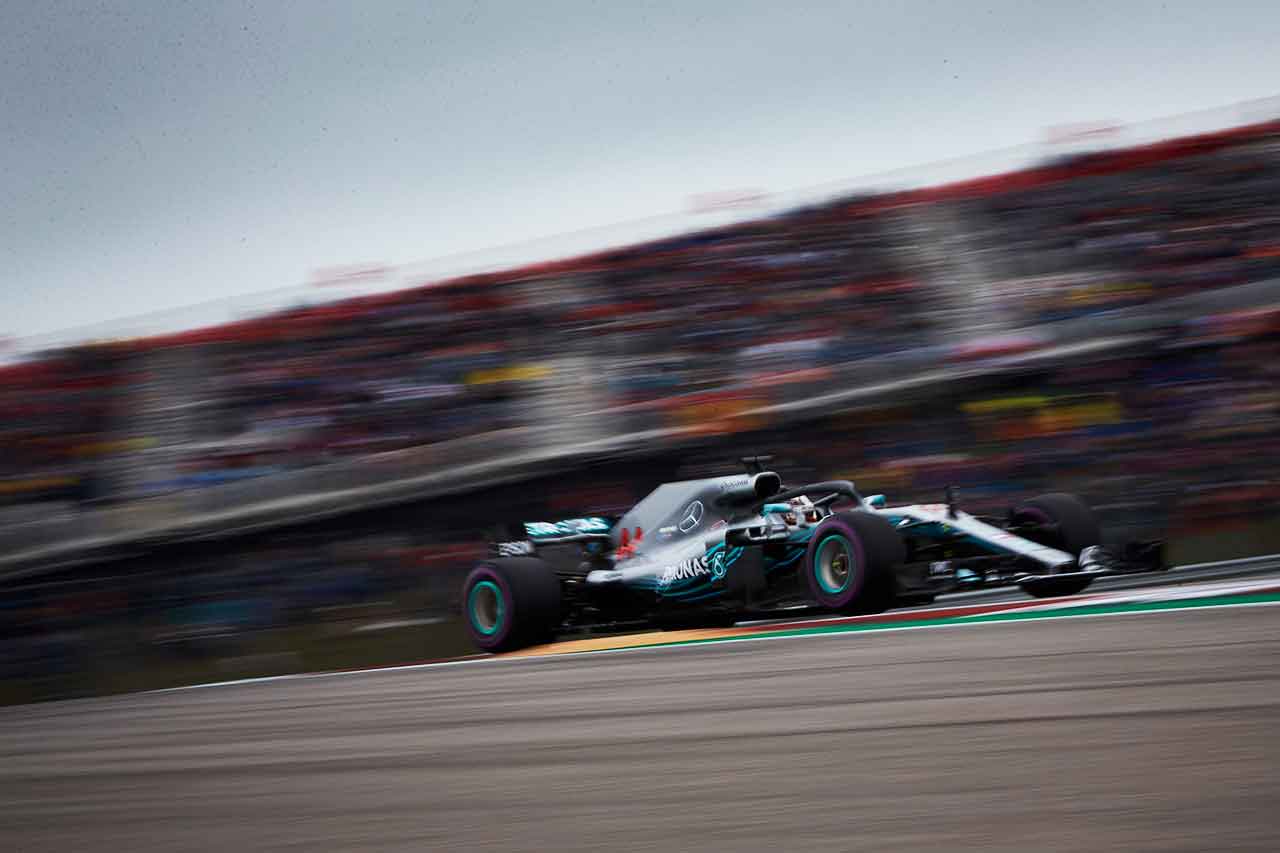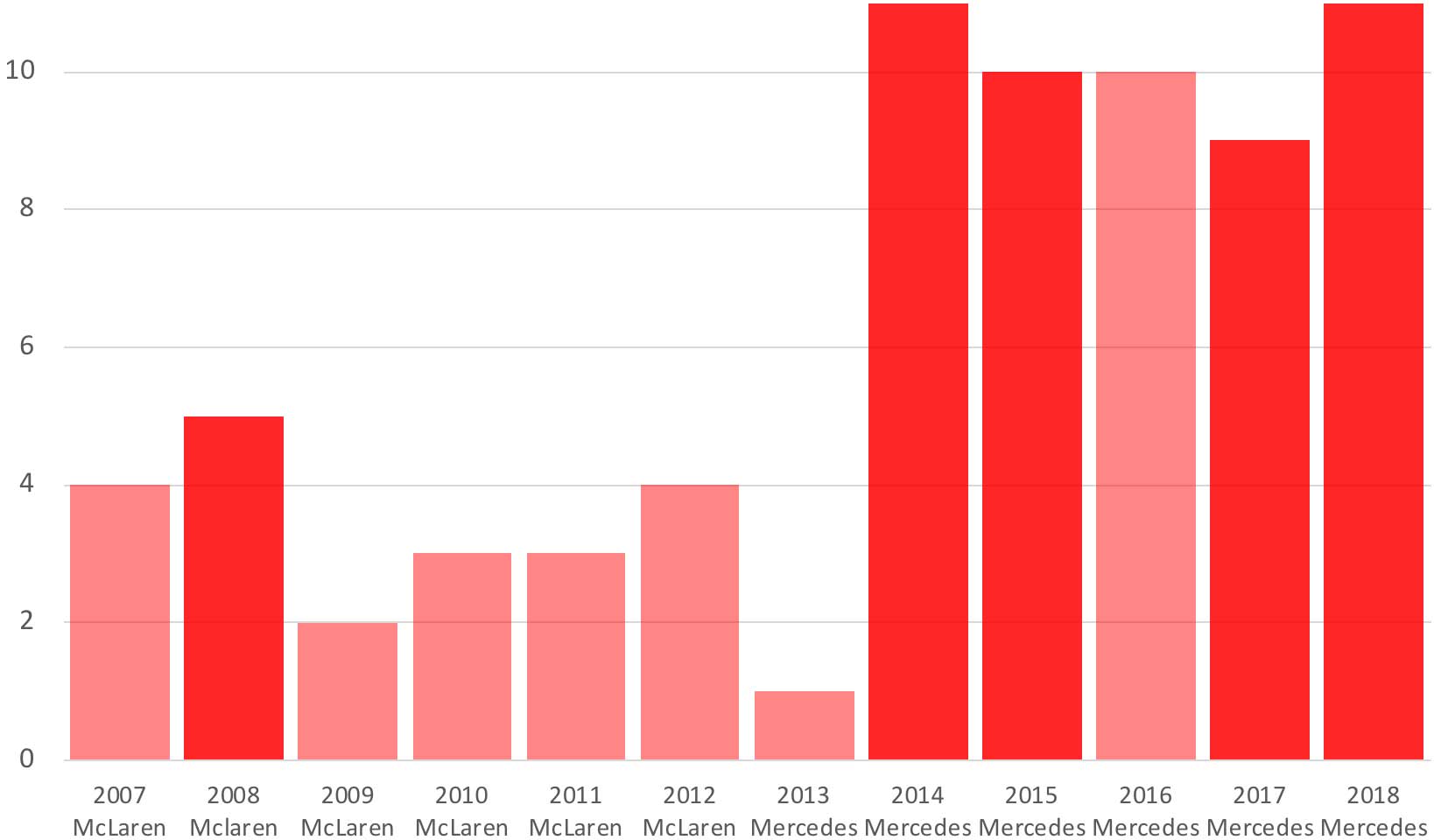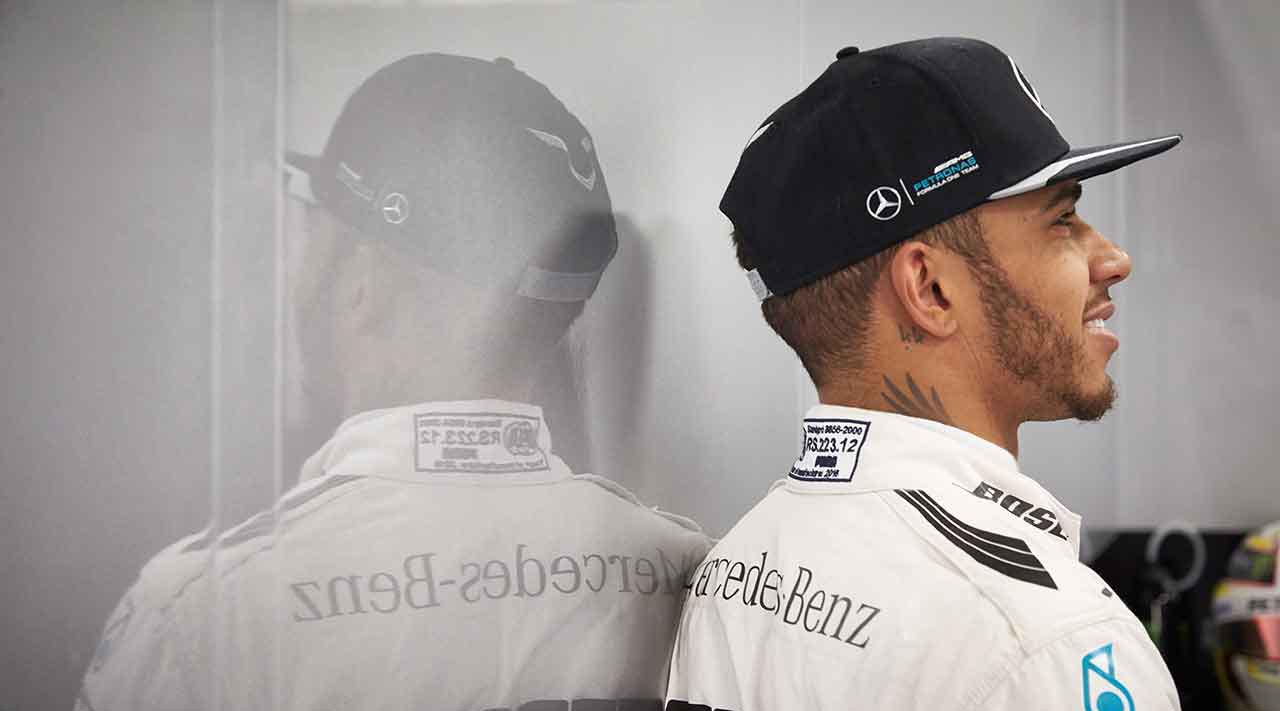Winning a fifth F1 world driver's championship in Mexico today propelled Lewis Hamilton into rarefied racing company. Only three drivers in the history of F1 racing have won five or more driver's titles. It's something Ayrton Senna never achieved, nor his arch rival Alain Prost. Jack Brabham, Jackie Stewart, Nelson Piquet and Niki Lauda only managed three each. Today Hamilton became part of an exclusive club, with only two other members: Juan Manuel Fangio (1951, 1954-57) and Michael Schumacher (1994-95, 2000-04).
Hamilton has a shot at Schumacher's all-time F1 records of seven driver's title wins and 91 race victories. But what are his chances?
To answer that we need to get an idea of how many more seasons Hamilton is likely to compete in F1, and how successful he can expect to be in those years.

Michael Schumacher (above left) retired at 37, then returned to F1 four years later. Kimi Raikkonen (above right) is still competitive at the age of 39. Jenson Button (below left) moved on from F1 at 36, Alonso is doing so at 37. Daimler/Exxon/Via Newspress

How long will Hamilton race in F1?
If there's anyone who knows how long Hamilton will remain in F1 it's Lewis – though it's quite likely that at this stage even he has no idea. But by drawing parallels with the careers of other top drivers it's possible to get an estimate of how long Hamilton's career is likely to continue.
Hamilton is now 33 and 2018 is his 12th season in F1, following a meteoric debut in 2007 when he almost won the world championship at his first attempt. He won his first driver's title in dramatic circumstances the following year. In July 2018 he signed a two-year contract extension which will see him race for Mercedes in F1 until at least the end of the 2020 season.
He will be 35 then. Is it likely he'd race on?
Sporting retirements are driven by all sorts of factors and come at a range of ages. Former England cricket captain Alastair Cook retired in 2018 at the age of 33. Eric Cantona had had enough of football at 30. Bjorn Borg retired from tennis at just 26. Hamilton's former team mate Nico Rosberg retired suddenly in 2016 after securing his own world championship title. He was two years younger than Hamilton is now.
Top-flight F1 drivers tend to be around 37 when they retire from the sport. Michael Schumacher was 37 when he retired in 2006, though he returned four years later for a three-season stint with Mercedes. Jarno Trulli retired from F1 at 37, Giancarlo Fisichella and Felipe Massa at 36, Rubens Barrichello at 39. Jenson Button was 36 when he moved on to other forms of racing, though he returned for a one-off McLaren drive at Monaco in 2017 when Fernando Alonso was away tackling the Indianapolis 500. Alonso – who is 37 – has announced he is leaving F1 at the end of this season, but hasn't ruled out a return in the future, just as other champions have done.
The oldest of the current drivers is Kimi Raikkonen, who will line up for Sauber next year at the age of 40 and has a contract extending to 2020. Raikkonen's 16 seasons in F1 were punctuated by a two-year sabbatical where he competed in the WRC. The oldest race winner in the modern era is Nigel Mansell, who was 41 when he won in Australia in 1994.
Hamilton famously has plenty of interests outside F1 racing – from music to acting to fashion – but he also clearly has an unremitting passion for the sport. So it would seem likely that he would race in F1 at least until he is 37, and could possibly win races in his early 40s. There was an interesting cameo at the US GP the other week when Hamilton said Raikkonen winning the race at the age of 39 had given him confidence in his own performance as he aged.
But with new F1 regulations coming in 2021 it might be that Hamilton decides he's done enough, and bows out at the end of his current contract in 2020. Whether or not Hamilton stays will depend on how keen he is to prove that he can win in the new era of 2021+ F1, and whether that justifies the work involved in understanding the new generation of cars and learning how to get the best out of them. Or whether he's more interested in proving he can succeed in areas outside the sport.
So Hamilton may have only another two seasons in F1, but quite likely another four, and at the outside could still be winning eight years from now.

Hamilton is second in the all-time list of GP winners behind Michael Schumacher. Daimler
What can Hamilton achieve?
Hamilton's first season with the Mercedes F1 team, in 2013, yielded just one win. In the five seasons since the start of the hybrid era in 2014 he has recorded between nine and 11 victories each year and won four championships. The most positive prediction would suggest that he could do the same again, but there are two reasons why that would be an optimistic forecast.
Lewis Hamilton F1 wins 2007-18

Solid red indicates championship-winning seasons

Charles Leclerc could be winning races for Ferrari in 2019. Alfa Romeo
First, the fickle nature of a sport which Murray Walker used to say was "IF spelt backwards". Just because Mercedes and Hamilton have had such a run of success in recent years it doesn't follow that that success will inevitably continue. Competitors don't stand still. Ferrari produced a very competitive car in 2018 - better than the Mercedes at some tracks - and it's likely they will again in future. Red Bull Racing adopt what seems to be a gradually improving Honda engine for 2019. Existing rivals like Sebastian Vettel and Max Verstappen are likely to be around at least as long as Hamilton – Vettel is two and half years younger than Hamilton, Verstappen more than 12 years younger. And there are impressive new drivers already in F1 or on their way - like 21-year-old Charles Leclerc, 22-year-old Esteban Ocon and rookies George Russell (20) and Lando Norris (18).
Second, the regulation changes coming in 2021. They are aimed at making the cars easier to drive close to each other, to improve the racing. Hamilton is as good in the cut-and-thrust of competition as any of his rivals so the prospect of tighter competition isn't necessarily a reason to believe he would be less successful. But there is a possibility that another team might do a better job of developing the aerodynamics of its 2021 car (and the proposed cost cap might negate Mercedes' resource advantage over some other teams) or that another driver might feel the new cars suited them better.
The warning signs come from the experience of Sebastian Vettel, who won four championships on the trot with Red Bull Racing in 2010-13 with 34 GP victories along the way – 13 of them in 2013, the most any driver has won in one season. Then in 2014, with new cars developed for the first year of the current hybrid formula, Vettel didn't win a single race.
What, then, can we predict with any certainty about Hamilton's future success?
With stability of regulations over the next couple of years – and stability in the team, as Mercedes has an option on Valterri Bottas for 2020 – it seems likely that Hamilton and Mercedes will go on winning at something like the rate they have over the past five years. Hamilton could win another 18-20 races by the end of 2020 - taking him close to, if not past, Michael Schumacher's all-time record for GP wins. If he can continue to win at that rate he will still be difficult to beat in the 2019 and 2020 championships, which means he might equal the German's record for championships by the end of 2020.
There's another record that is Hamilton's to lose, one he both extends and puts at risk with each passing year
Beyond that it's more difficult to predict how long Hamilton will continue and how successful he'll be. But if he does carry on to the age of 37 or so, where many F1 drivers decide to stop, if Mercedes can continue to produce competitive cars, and if Hamilton can maintain his form and his motivation, he should have a good chance of beating Schumacher's records - records which, when they were set, looked so far out of reach that they might never be broken.
Hamilton could be the first to win more than 100 GPs – another four seasons at an average of seven wins a year would do it, and F1's push to add more races to the calendar won't hurt. He will almost certainly extend the career record for pole positions, which he already holds, to more than 100.
But there's another record that is Hamilton's to lose, one he both extends and puts at risk with each passing year: he is the only driver with a multi-season career who has won a race in every year he has competed. Not even Fangio or Schumacher could manage that.
